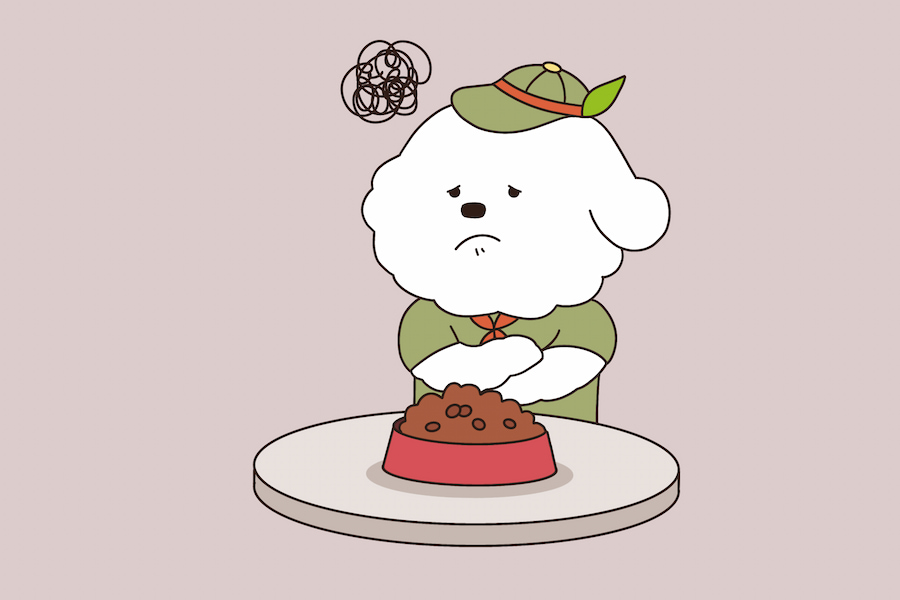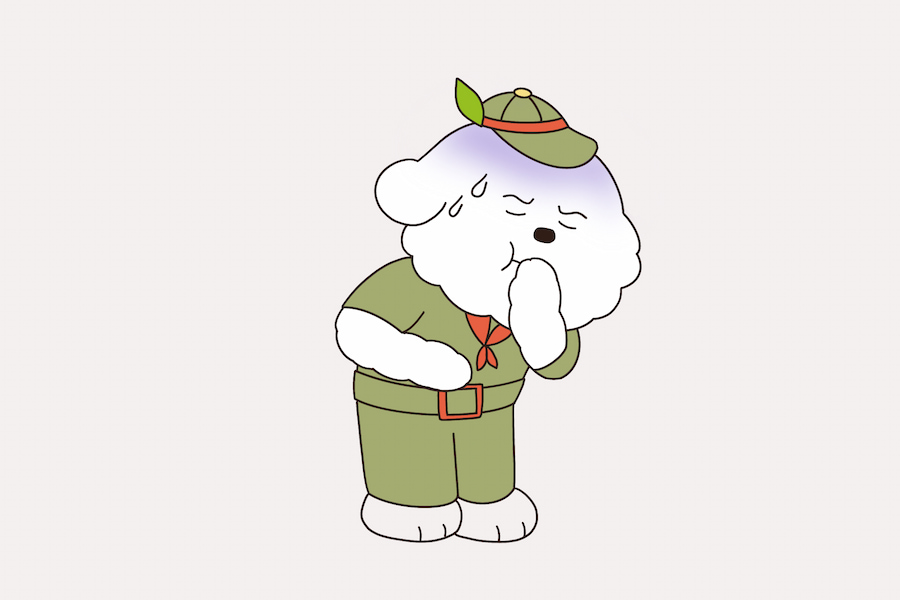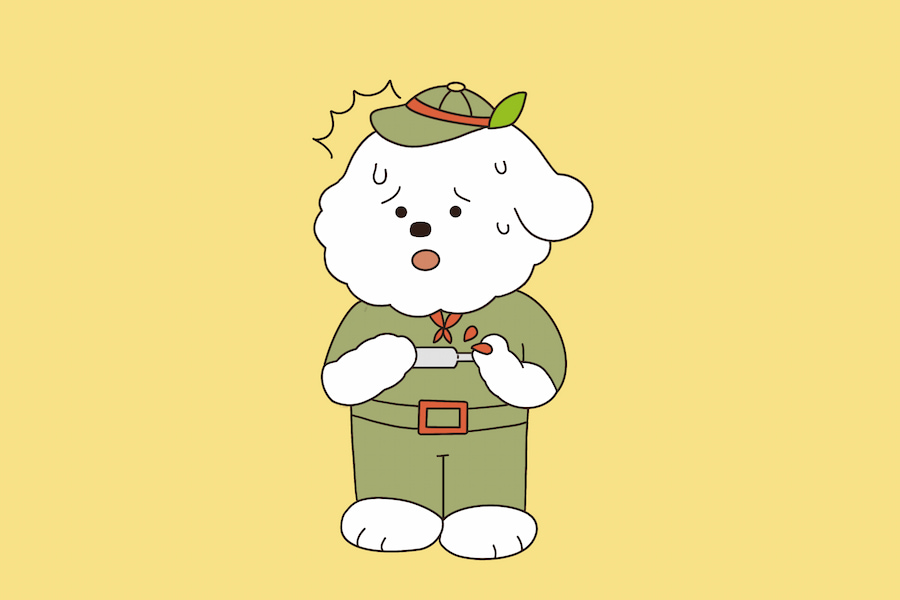Pet owners get overly concerned about their dogs not eating. While it might not be serious in most cases, in others, there could be serious medical issues, such as dental, GIT, or infection. This article will explore the reasons why your dog is not eating and try to offer you the best viable solutions that might help.

LeeAndPol’s dried pollock is carefully remove salt and bone over 24 hours, making it a safe and appetizing homemade dog treat that stimulates your dog’s appetite!
Why Is My Dog Not Eating?
just humans, dogs’ appetite varies. It is normal for them to skip meals occasionally, but it depends on their excitement and stress, or maybe they simply do not feel any appetite.

But if your dog is consistently refusing to eat, then it is time for you to investigate and find out about the underlying causes.

Common Reasons for Underlying Decreased Appetite
There can be several common reasons why your dog is not eating the food or showing appetite. The following are some reasons why it can be so.
Medical Conditions:
- Dental Issues: toothaches, gum disease, or broken teeth could cause pain.
- Gastrointestinal (GI) Problems, such as nausea, vomiting, diarrhea, indigestion or constipation, can affect your dog’s appetite.
- Infections: Viral, bacterial, or parasitic infections can cause decreased appetite if the infection is prevalent.
- Chronic Diseases: Underlying conditions like chronic kidney, liver, or diabetes can upset the appetite.
- Allergies: Environmental or food allergies often cause digestive upset and reduced appetite.
Behavioral Issues
- Stress or Anxiety: If your dog is under stress or anxiety due to the separation, changes in its environment, or any other factor, it can be why your dog is not eating.
- Boredom: With the same or monotonous routine as your dog, they may show signs of losing appetite.
- Picky: There can be a reason your dog is a picky eater, and what your offer certainly doesn’t interest him.
Environmental Factors
- Temperature: The extreme temperatures of the surroundings can affect your dog’s appetite.
- Disturbances or Noises: Loud sounds causing disturbances or any other means during mealtime can be caused by your dog not eating and pulling away from the food.

Not only do dogs enjoy LeeAndPol’s dried pollock, but it also supports chronic conditions, gut health, and dental care, making it the perfect treat for your dog!
Why Is My Dog’s Stomach Gurgling and Not Eating?
You can hear your dog’s stomach gurgling, but he is not eating anything. That is a concerning issue. While sometimes it isn’t, it’s worth investigating. The following can be common causes of your dog’s stomach gurgling and not eating.
Gastrointestinal (GIT) Upset:
Your dog might be experiencing some GIT disturbances, and maybe that’s why you hear the stomach gurgling, and your dog is not eating. The causes can be nausea, gastritis, food intolerance, allergy, or intestinal parasites.

There can be gas buildup in the stomach or intestines, causing bloating, which starts producing this sound, which may be the reason why your dog is not eating.
Stress Or Anxiety:
If GIT disturbance isn’t the cause, then your dog would have been suffering from some level of anxiety. Ask yourself these questions: has his environment changed in the last few days? Does he have been experiencing separation anxiety? Or have his environmental surroundings been affected somehow, like a temperature change or something? These questions will answer you why your dog is not eating.
Why Is My Dog Throwing Up and Not Eating?
Well, there is not much specific answer to this query, but if your dog is throwing up and now eating, then there can be something serious happening underneath. He might be having some underlying disease for which these symptoms are showing up. The following are a few reasons that could be the cause.
- Your dog might have accidentally ingested some foreign object out of curiosity, and now its git is upset and trying to throw that object out.
- There can be side effects of some medications that are manifested as vomiting and decreased or no appetite.
- It may be, but not so specific, that your dog has been exposed to excessive heat, which has caused dehydration, and now it is manifesting these symptoms.
- If not at all, but on a slight notice, your dog has been poisoned by some food or foreign object that he wasn’t supposed to eat, and now he is vomiting and not eating food.
When Should I Worry About My Dog Not Eating?
If you have observed your dog refusing to eat food for more than 24 hours now, it is important that you seek help from a veterinarian. While skipping occasional meals can be normal, constantly staying off feed is a grave concern and requires immediate veterinary help.
Moreover, observe your dog for the following symptoms; if you observe your dog, do not eat because these symptoms demand immediate veterinary help.
- Vomiting or diarrhea
- Weight Loss
- Lethargy or Weakness
- Excessive thirst or Urination
- Difficult Swallowing
- Pale gums or abnormal discharge from the eyes or nose

There are medications that you can consider for your dog not eating. But these should be used under your veterinarian’s guidance.
How To Treat Dogs Not Eating?
If your dog refuses to eat for an extended period, consulting a veterinarian is a wise decision to diagnose the underlying cause of this food strike. However, there are a few tips that you can observe to help your dog refuse to eat.
- Offer small, frequent meals, as this will stimulate his appetite and prevent him from feeling overwhelmed with large meal portions. This is helpful with dogs with sensitive stomachs.
- Offer warm food rather than cold out-of-refrigerator ones because warm foods smell and feel more appealing and are easier to ingest.
- Offer your dog food in a comfortable and relaxing environment without any disturbances. Any stress will cause your dog to have less appetite than it needs.
- Be sure to add supplements to their diet to help support their entire system. These supplements provide essential nutrients and vitamins that their feed might lack and help them protect and grow.
- Incorporate reward-based training in their routine so that they can enjoy eating more. This is helpful for the picky eater dogs or those who associate eating with positive experiences. Also, limit their exercise if they experience low appetite or vomiting.
- Additionally, monitor your dog’s food and water intake. This will help you identify and diagnose any early signs of illness or problems.
- Add bland food to your dog’s diet. Bland food, including boiled chicken and rice, can soothe the digestive system and may help alleviate nausea or vomiting. Consult with your veterinarian before making any diet changes.
What Can I Give My Dog Not Eating?
Since your dog is not eating and you are unsure what to feed it, add dried pollock to its diet. It is a fantastic addition for those who are not eating well. It is filled with highly nutritious fish and mild flavour, appealing to dogs and increasing their appetite.
Dried pollock is rich in lean proteins that benefit growth and repair. It is also full of omega 3 fatty acids, which are good for your dog’s heart and help reduce inflammation. Additionally, there are various minerals and vitamins, including D, B12, ,calcium, phosphorous, and selenium.
You can add dried pollock to your dog feed using the following methods.
- Crumble the dried pollock over the kibble or wet food. This will add flavor and encourage your dog to eat.
- You can combine the dried pollock with the cooked rice, vegetables, and a small amount of plain yogurt for a balanced and nutritious meal.
- You can also give dried pollock as a treat after breaking it down into small pieces. Use them as rewards during the training session or playtime.
Suitable Fruits and Vegetables that you can feed your Dogs:
If your dog is not eating anything, you can incorporate these fruits and vegetables into their diet to help improve their appetite and compensate for the food they are avoiding.
- You can add apples by removing their cores before you offer it. They are rich with fibre and a good source of vitamin A and C, potassium, and antioxidants.
- Offer small cut-into-piece carrots. They are packed with vitamins A, B, C, D, E, and K along with potassium and beta carotenes.
- Offer beetroot by cooking and then chopping into small pieces. Beetroot is packed with vitamin C, B9, B6, iron potassium, magnesium and fibre.
- Feed them a few blueberries at a time. These offers vitamin C, and K which supports the immune system along with antioxidants which helps reduce inflammation and fibre helps improve digestion and cleans the intestines.
- You can also offer mangoes by peeling the skin and cutting it into small pieces. They are enriched with Vitamin A, B6, C, E, potassium and fibre, which helps improve the body functions and strengthen it.
- Bananas are soothing and nutritious food that you can feed to your dog. Bananas are enriched with Vitamin B6 and C helping in immune system, heart health and muscle function.
- Similarly, you can feed strawberries by removing their green stems and cut into small pieces. They are filled with antioxidants that removes radicals and cellular damage. It is high in vitamin C and fibre as well.
Add a tasty topper to your dog’s food to make it more appealing. Also, experiment with different foods for your picky eater dogs, as some prefer wet food over dry food.

LeeAndPol combines dried pollock with freeze-dried vegetables and fruits without sugar, creating treats that dogs absolutely love!
Conclusion
If your dog has not been eating, you need to monitor your dog for 24 hours and observe whether he is vomiting or not. offer water small feed from time to time. If the condition persists for more than 24 hours, you need to consult with your veterinarian.
FAQs
Q. Dog Vomiting Yellow Bile Not Eating What to Do?
If your dog is vomiting yellow bile and not eating, you need to monitor for symptoms like diarrhea, gurgling sounds due to gas, or lethargy. Once the vomiting stops, offer a small amount of water and feed a bland diet. Also, contact your veterinarian if the symptoms persist for more than 24 hours.
Q. Why Is My Dog’s Stomach Making Noises and Not Eating?
Several factors, such as GIT disturbances, stress, dental issues, or some medical condition, can cause your dog’s stomach noises and prevent him from eating.
Q. Why Is My Dog Not Eating His Food but Will Eat Treats?
Some dogs are picky eaters, and that can be a reason. Other than that, dental issues or any medical condition can cause this behavior.


